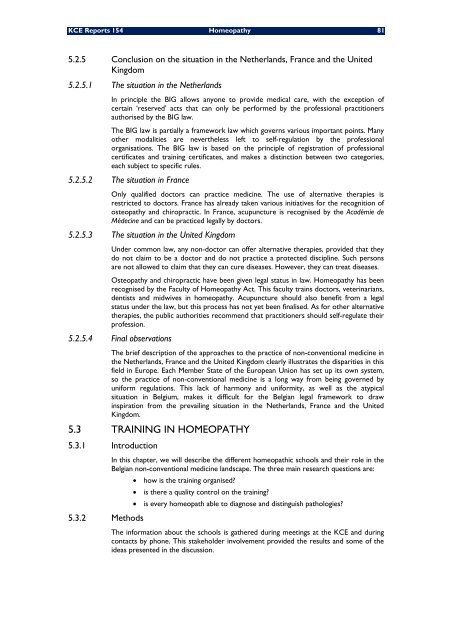Etat des lieux de l'homéopathie en Belgique - KCE
Etat des lieux de l'homéopathie en Belgique - KCE
Etat des lieux de l'homéopathie en Belgique - KCE
Create successful ePaper yourself
Turn your PDF publications into a flip-book with our unique Google optimized e-Paper software.
<strong>KCE</strong> Reports 154 Homeopathy 81<br />
5.2.5 Conclusion on the situation in the Netherlands, France and the United<br />
Kingdom<br />
5.2.5.1 The situation in the Netherlands<br />
In principle the BIG allows anyone to provi<strong>de</strong> medical care, with the exception of<br />
certain ‘reserved’ acts that can only be performed by the professional practitioners<br />
authorised by the BIG law.<br />
The BIG law is partially a framework law which governs various important points. Many<br />
other modalities are nevertheless left to self-regulation by the professional<br />
organisations. The BIG law is based on the principle of registration of professional<br />
certificates and training certificates, and makes a distinction betwe<strong>en</strong> two categories,<br />
each subject to specific rules.<br />
5.2.5.2 The situation in France<br />
Only qualified doctors can practice medicine. The use of alternative therapies is<br />
restricted to doctors. France has already tak<strong>en</strong> various initiatives for the recognition of<br />
osteopathy and chiropractic. In France, acupuncture is recognised by the Académie <strong>de</strong><br />
Mé<strong>de</strong>cine and can be practiced legally by doctors.<br />
5.2.5.3 The situation in the United Kingdom<br />
Un<strong>de</strong>r common law, any non-doctor can offer alternative therapies, provi<strong>de</strong>d that they<br />
do not claim to be a doctor and do not practice a protected discipline. Such persons<br />
are not allowed to claim that they can cure diseases. However, they can treat diseases.<br />
Osteopathy and chiropractic have be<strong>en</strong> giv<strong>en</strong> legal status in law. Homeopathy has be<strong>en</strong><br />
recognised by the Faculty of Homeopathy Act. This faculty trains doctors, veterinarians,<br />
<strong>de</strong>ntists and midwives in homeopathy. Acupuncture should also b<strong>en</strong>efit from a legal<br />
status un<strong>de</strong>r the law, but this process has not yet be<strong>en</strong> finalised. As for other alternative<br />
therapies, the public authorities recomm<strong>en</strong>d that practitioners should self-regulate their<br />
profession.<br />
5.2.5.4 Final observations<br />
The brief <strong><strong>de</strong>s</strong>cription of the approaches to the practice of non-conv<strong>en</strong>tional medicine in<br />
the Netherlands, France and the United Kingdom clearly illustrates the disparities in this<br />
field in Europe. Each Member State of the European Union has set up its own system,<br />
so the practice of non-conv<strong>en</strong>tional medicine is a long way from being governed by<br />
uniform regulations. This lack of harmony and uniformity, as well as the atypical<br />
situation in Belgium, makes it difficult for the Belgian legal framework to draw<br />
inspiration from the prevailing situation in the Netherlands, France and the United<br />
Kingdom.<br />
5.3 TRAINING IN HOMEOPATHY<br />
5.3.1 Introduction<br />
5.3.2 Methods<br />
In this chapter, we will <strong><strong>de</strong>s</strong>cribe the differ<strong>en</strong>t homeopathic schools and their role in the<br />
Belgian non-conv<strong>en</strong>tional medicine landscape. The three main research questions are:<br />
• how is the training organised?<br />
• is there a quality control on the training?<br />
• is every homeopath able to diagnose and distinguish pathologies?<br />
The information about the schools is gathered during meetings at the <strong>KCE</strong> and during<br />
contacts by phone. This stakehol<strong>de</strong>r involvem<strong>en</strong>t provi<strong>de</strong>d the results and some of the<br />
i<strong>de</strong>as pres<strong>en</strong>ted in the discussion.

















